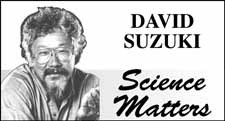When my daughter Severn was born in 1979, my wife Tara and I wanted to raise her with an understanding that a lot of food is seasonal, particularly vegetables and fruits, especially in a country like Canada. The only reason we can always get fresh strawberries, tomatoes, avocadoes, and lettuce is because we use the entire planet as a source of products. When oil was cheap and our awareness of climate change was limited, we had the illusion that it was practical to have inexpensive, fresh vegetables and fruit from all over the world year-round. Now we know better, and more people are eating food that is organic, local, and seasonal.
Around the world, people celebrate our connectedness with the rest of the biosphere through festivals for blueberries, rice, strawberries, and peaches. Tara and I love cherries. We thought it would be great to celebrate their season with an annual ritual. So for 32 years, we have looked forward to our annual cherry run, which begins as soon as school ends. We have loaded up the van and camped our way toward the Okanagan Valley where, depending on what kind of spring it was, we might start south in Osoyoos, or further north in Penticton or Kelowna.
It has become a wonderful ritual, a kind of reward at the end of a school year - even though we've sometimes watched our daughters suffer the gastrointestinal problems of gorging on too much fruit. Over the years, they have brought friends and cousins and boyfriends, as much for the swimming and horseback riding as for picking and eating cherries. Now we look forward to our grandchildren participating in the tradition.
When we started this ritual, Kelowna, Penticton, Oliver, and Osoyoos were small towns, delightful to visit and no doubt beautiful places to live. Yet over the years, the area has transformed. Now huge houses and wineries dominate the valley. People have poured into the area, attracted by climate and amenities like fishing and hiking, skiing, and relatively inexpensive homes. In the process, the towns we delighted in visiting have become choked with traffic, air and water pollution, shopping mall after shopping mall of chain businesses, social problems of drugs and violence, and tensions between itinerant labour and locals. And looming always as a major issue is water - too many people and too much demand.
Once, productive soil generated a cornucopia of good food. Now, much of that land has been converted to accommodate big houses and boutique vineyards often run by absentee owners. I doubt that any local politicians in 1979 would have opted for the kind of places their communities have become today. Yet this is happening all over the country, as people seize the short-term benefits of an economic shot-in-the-arm from opening new developments, filling in wetlands, diverting streams, and so on. In the process, the communities that attracted people in the first place are disappearing.
The problem is that agendas based solely on economics and politics are, by definition, short-term. That is the very nature of these activities. We have few mechanisms to define what people like about the communities they live in, what they hope will still flourish when their children grow up and start having children of their own.
It seems weird to me, living in the wonderful neighbourhood of Kitsilano in Vancouver, that my children will not be able to afford to live in a house like the one they grew up in. That's not a sustainable, stable community. We have to keep the big picture in mind and make sure we don't sacrifice the very things that made a community attractive in the first place. And we must protect the things that keep the planet and our local surroundings rich, diverse, and healthy.
The annual pilgrimage that we started so long ago provides me with a perspective, and context to consider where we are and where we seem to be going. All communities need that, and I guess it resides in the elders, folks who have a long history and experience in a place. They can define the pace of change and consider whether it is what people want and need.
Dr. David Suzuki is a scientist, broadcaster, author, and co-founder of the David Suzuki Foundation.




